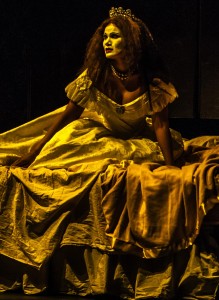The Sandbox opens inside a blinding yellow set, and the audience oohs at the sight of a rippling male abdomen, belonging to that of a nameless Young Man standing on a beach, as he stretches his arms up and down. The first impression of this play, the opener in three one-acts under the umbrella title of “Signature Plays,” is that of visual and aural superfluity. In the remaining two plays, Drowning by María Irene Fornés and Funnyhouse of a Negro by Adrienne Kennedy, the visual impressions push and pull between deficit and excess. Albee, Kennedy and Fornés, all resident artists of Signature Theatre’s past seasons, are commemorated in this series of plays; with such heavyweights, it’s no surprise that empathy, satire, and metaphor figure beautifully in a production that fantastically sequenced and pleasingly produced.
In Edward Albee’s tragicomic The Sandbox, bright, gaudy beachwear dances on the bodies of the players, and a cellist plays an affecting, mournful solo throughout. Mommy (Alison Fraser) and Daddy (Frank Wood) are spending an aimless, empty day at the beach, and have dragged a particularly voluble Grandma (Phyllis Somerville) along. Grandma is nearing her end, and she is (ironically) very much taken by the Young Man (Ryan-James Hatanaka) flexing and stretching beside her. Hilarious fourth-wall breaks somewhat diminish the cello’s winding dirge (the music is by Brandon Wolcott), but age and the requisite humor of growing old suffuse Albee’s questions with sadness. The cake-like set (by Mimi Lien) is jarringly reminiscent of filmmaker Wes Anderson’s visual ideas; the striking environment serves as the backdrop for the writer’s melancholic humor. Under Houghton’s masterful direction, the actors are the visual realization of Albee’s kooky, world-weary amusement.
From this melancholic treat for the eyes and ears, we are steered into María Irene Fornés’ Drowning. If there was ever a play that was built to test the dramatic resolve of its audience, it is Drowning. Fornés’ one-act play takes place in what looks like a old-timey diner. The first visual shock we receive are the strange, melted get-ups that the two main characters, Pea (Mikeah Ernest Jennings) and Roe (Sahr Ngaujah), have on. They have science-fiction bodies, although Roe reassures Pea: “You are made of human flesh.” And for our next visual jolt: every movement the actors make is made with agonizing, breathtaking slowness. The push of a newspaper, a lean forward, even the blink of the eye, are retrograded and decelerated. Jennings and Ngaujah move through molasses, as their characters struggle to reconcile their inward innocence and hope with society's reactions to their ugliness.
In perhaps the highlight of the production, Fornés’ slow-moving masterpiece is rendered into a magical, morphing painting. Every visual element is a lullaby of movement. When Pea is rejected by a "fair" woman he has fallen for, Jennings electrifies his performance with anguish, breaking the slow, known rhythm of movement through molasses and yielding to a restive, frenzied unhappiness. His vocalizations of this unhappiness and particularly moving: he says that he is “too smooth and black” for this world, too ugly, undesirable and rough to validate his claim for a fair woman's love. It is difficult to ignore, as is Fornés’ intention, the sharp allegorical reference to the modern plight of the young black man. How does he deal with society's rejection of him, a rejection so inherently based on the color of his skin? Does he ignore the tension bubbling inside of him, as Ngaujah’s Roe does, or does he have no choice but to exorcise it by speaking aloud, as the unfortunate Pea endeavors to?
But if Drowning was a statement on the modern condition of the young black man, Adrienne Kennedy’s Funnyhouse of a Negro is the ultimate homage to the modern mixed life of a half-black, half-white woman. As the final piece in the production, Funnyhouse’s undeterred commitment to shock, upset and amaze its viewers proved an almighty boon to Kennedy's terrific play. From direction (Houghton) to brilliant costume and sound design (Kaye Voyce and Wolcott, respectively), Funnyhouse was the standout piece of the night. It follows the elegantly cosmopolitan mind of the author, studying English literature in New York and living in anonymity, yet struggling with the emotional trauma of her family’s past. On stage, the author (played by Crystal Dickinson) guides us through her varied relationships with Patrice Lumumba, her father and a troubled African priest (a fantastic Sahr Ngaujah), Jesus, and her gold-clad avatars, including the white-faced Duchess of Hapsburg. Booms and swells of jolting, terrifying music punctuate Kennedy’s allegories. Each actor inflects his lines with the playwright’s unique poetic intent—that her emotional life has the makings of a nightmare. It is full of sound, fury and the inescapable divisiveness of growing up as black and a white woman.
Scenic designer Lien again creates a resplendent set, full of moving staircases, disappearing mirrors and golden chandeliers. Red draperies hang from a gilded bed, and pockets of light shine suggestively in corners. The beauty of the final play reminds us strikingly of that bright yellow scene from The Sandbox, and the dancer-like finesse of Drowning. Director James Houghton has seemingly bound the threads of three disparate tales into a single, heady production. Aside from the welcome challenge of building one’s visual literacy as a theatergoer, eyes and ears will take infinite delight in the impressionistic treats of the “Signature Plays.”
“Signature Plays” runs through June 12 in The Alice Griffin Jewel Box Theatre at The Pershing Square Signature Center (480 West 42ndSt.,between 9th and 10th Avenues). For dates and box office information, please visit http://www.signaturetheatre.org//tickets/production.aspx?pid=4284








